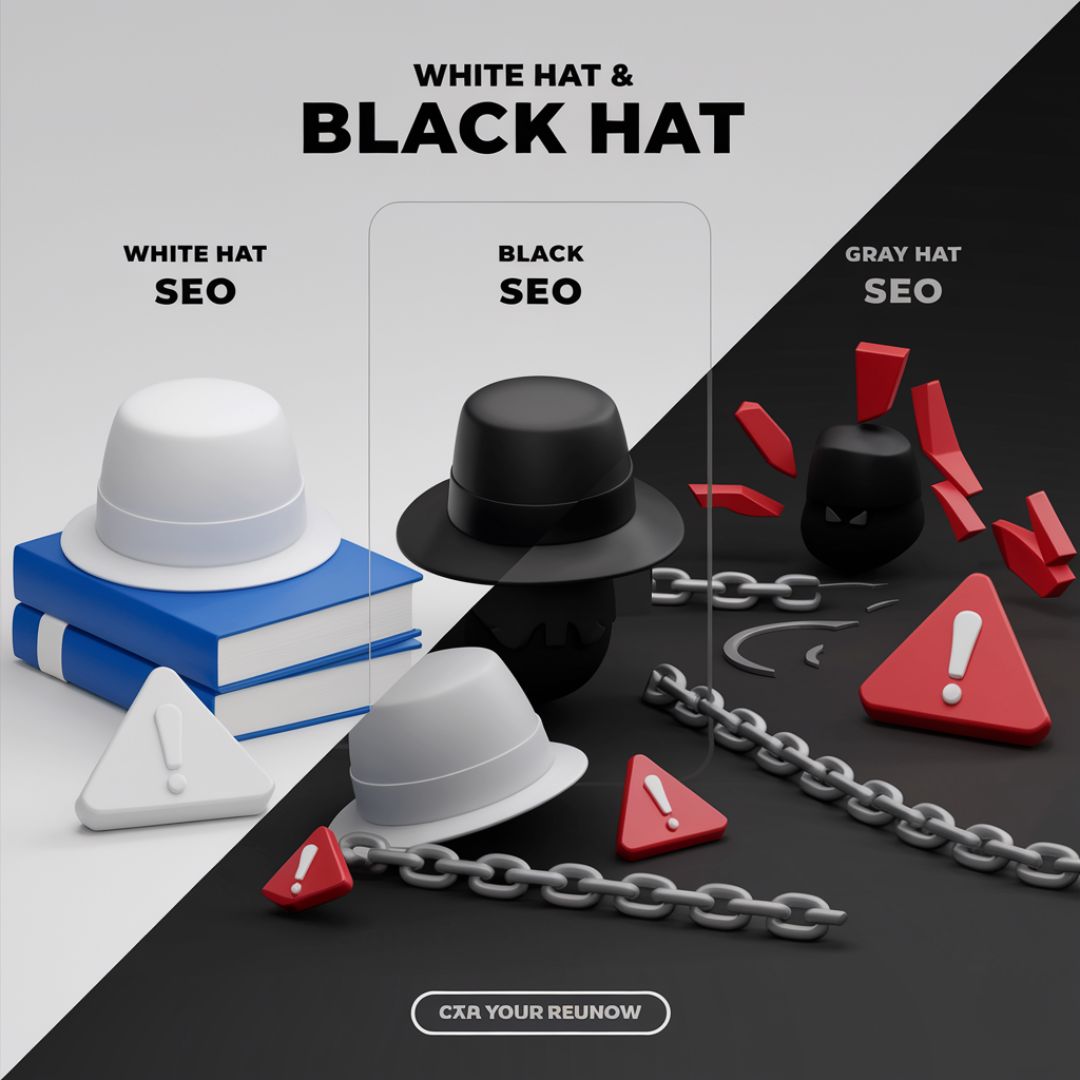White Hat vs. Black Hat vs. Gray Hat SEO Strategies: Which is Best for Your Website?
Learn the differences between White Hat, Black Hat, and Gray Hat SEO strategies. Discover the pros, cons, and risks of each approach, and find out which SEO technique is best suited for long-term success in improving your website’s rankings.

White Hat, Black Hat, and Gray Hat SEO: Understanding the Strategies
Search Engine Optimization (SEO) is a crucial component of any digital marketing strategy, helping businesses increase visibility and drive organic traffic to their websites. But when it comes to choosing the right SEO approach, you may encounter terms like “White Hat,” “Black Hat,” and “Gray Hat” SEO. Each of these strategies represents a different set of practices, ranging from ethical to unethical.
In this blog, we’ll break down the differences between these three SEO strategies, explore their advantages and risks, and help you decide which is best suited for your website.
What is White Hat SEO?
White-hat SEO refers to the ethical and best-practice SEO techniques that comply with search engine guidelines (e.g., Google’s Webmaster Guidelines). These strategies focus on improving user experience and building a website’s authority organically, ensuring long-term results.
Key White Hat SEO Techniques:
- High-Quality Content Creation: Developing relevant, informative, and engaging content that provides value to users.
- Keyword Optimization: Conducting research to find the right keywords and naturally incorporating them into your content without overstuffing.
- On-page SEO: Optimizing meta tags, headers, and images, and ensuring the website is mobile-friendly and fast.
- Link Building: Earning backlinks from reputable, authoritative websites through organic outreach.
- User Experience (UX): Enhancing website navigation, load time, and overall usability to improve user satisfaction.
Pros of White Hat SEO:
- Long-lasting, stable results.
- No risk of penalties from search engines.
- Builds trust and credibility with users and search engines.
- Enhances user experience, leading to higher engagement and conversions.
Cons of White Hat SEO:
- Takes time to see significant results.
- Requires consistent effort, high-quality content, and strategic planning.
Is White Hat SEO Best for Your Website?
If you’re focused on sustainable, long-term growth, White Hat SEO is your best option. It may take time to see results, but the outcomes are solid and long-lasting, building a positive reputation for your website.
White Hat vs Black Hat vs Gray Hat SEO Strategies: Which is Best for Your Website?
Search Engine Optimization (SEO) is a crucial component of any digital marketing strategy, helping businesses increase visibility and drive organic traffic to their websites. But when it comes to choosing the right SEO approach, you may encounter terms like “White Hat,” “Black Hat,” and “Gray Hat” SEO. Each of these strategies represents a different set of practices, ranging from ethical to unethical.
In this blog, we’ll break down the differences between these three SEO strategies, explore their advantages and risks, and help you decide which is best suited for your website.
What is White Hat SEO?
White-hat SEO refers to the ethical and best-practice SEO techniques that comply with search engine guidelines (e.g., Google’s Webmaster Guidelines). These strategies focus on improving user experience and building a website’s authority organically, ensuring long-term results.
Key White Hat SEO Techniques:
- High-Quality Content Creation: Developing relevant, informative, and engaging content that provides value to users.
- Keyword Optimization: Conducting research to find the right keywords and naturally incorporating them into your content without overstuffing.
- On-page SEO: Optimizing meta tags, headers, and images, and ensuring the website is mobile-friendly and fast.
- Link Building: Earning backlinks from reputable, authoritative websites through organic outreach.
- User Experience (UX): Enhancing website navigation, load time, and overall usability to improve user satisfaction.
Pros of White Hat SEO:
- Long-lasting, stable results.
- No risk of penalties from search engines.
- Builds trust and credibility with users and search engines.
- Enhances user experience, leading to higher engagement and conversions.
Cons of White Hat SEO:
- Takes time to see significant results.
- Requires consistent effort, high-quality content, and strategic planning.
Is White Hat SEO Best for Your Website?
If you’re focused on sustainable, long-term growth, White Hat SEO is your best option. It may take time to see results, but the outcomes are solid and long-lasting, building a positive reputation for your website.
What is Black Hat SEO?
Black Hat SEO is the opposite of White Hat SEO. It involves unethical or manipulative techniques designed to trick search engines into ranking a website higher. These strategies violate search engine guidelines, and while they may produce fast results, they come with significant risks, including penalties and de-indexing.
Key Black Hat SEO Techniques:
- Keyword Stuffing: Overloading a webpage with irrelevant or excessive keywords to manipulate search rankings.
- Cloaking: Showing one version of content to search engines and a different version to users.
- Paid Links: Purchasing backlinks from low-quality or irrelevant websites to falsely inflate authority.
- Hidden Text or Links: Embedding keywords or links in a way that is invisible to users but readable by search engines.
- Duplicate Content: Copying content from other websites and republishing it without adding value or originality.
Pros of Black Hat SEO:
- Fast, short-term results in terms of rankings and traffic.
- Can provide quick visibility for competitive keywords.
Cons of Black Hat SEO:
- High risk of penalties, such as getting banned from search engines.
- Unsustainable results, as search engines regularly update their algorithms to detect and penalize manipulative tactics.
- Poor user experience, often leading to low engagement and high bounce rates.
Is Black Hat SEO Best for Your Website?
While Black Hat SEO may seem tempting if you want quick wins, it’s generally not worth the risk. The potential penalties, including being removed from search engine results entirely, can severely harm your website’s long-term prospects.
What is Gray Hat SEO?
Gray Hat SEO falls between White Hat and Black Hat SEO. These techniques are not outright illegal or unethical, but they are somewhat questionable. Gray Hat tactics often exploit loopholes in search engine algorithms, which means they could eventually result in penalties if algorithms are updated to detect them.
Key Gray Hat SEO Techniques:
- Link Exchanges: Trading backlinks with other websites, a tactic that is not strictly against guidelines but may not be natural.
- Clickbait Titles: Using overly sensational or misleading headlines to attract clicks.
- Content Spinning: Rewriting or slightly altering existing content to create new articles, often without adding real value.
- Private Blog Networks (PBNs): Building a network of websites solely for the purpose of linking to a central website.
- Paid Reviews: Offering incentives for positive reviews, which may influence rankings indirectly.
Pros of Gray Hat SEO:
- Faster results than White Hat SEO.
- Lower risk than Black Hat SEO.
- Flexibility in employing various tactics.
Cons of Gray Hat SEO:
- Higher risk of penalties over time as search engines get better at detecting manipulative practices.
- Not a truly sustainable approach for long-term growth.
Is Gray Hat SEO Best for Your Website?
If you’re willing to take moderate risks and are looking for faster results, Gray Hat SEO might be appealing. However, it’s important to remember that search engine algorithms evolve, and what works today might be penalized tomorrow. For businesses looking to build a lasting presence, Gray Hat SEO is not a foolproof solution.
Which SEO Strategy is Best for Your Website?
Deciding which SEO strategy to use depends on your business goals, timeframe, and risk tolerance.
- White Hat SEO is the safest, most sustainable option for businesses looking to build long-term authority and trust. Although it takes time, the results are reliable and ethical.
- Black Hat SEO offers quick wins but comes with significant risks that could result in penalties or de-indexing, making it unsuitable for most businesses.
- Gray Hat SEO lies in a murky area between the two. While it may offer faster results than White Hat SEO, it still involves some level of risk that could harm your website in the long run.
For most businesses, White Hat SEO is the best choice. It ensures compliance with search engine guidelines, provides valuable content to users, and fosters long-term growth without risking penalties. While it may require more time and effort, the rewards are stable, consistent, and beneficial for the future of your website.
Conclusion: Choose Wisely for Lasting Success
SEO is a long-term investment, and the strategy you choose will have lasting implications on your website’s success. While Black Hat and Gray Hat SEO strategies might seem tempting for fast results, the risks they carry could cost you in the long run. White Hat SEO, on the other hand, focuses on sustainable, ethical practices that enhance user experience and improve search rankings over time.
The choice is yours—do you want short-term gains with potential penalties or long-term, sustainable growth?
If you’re ready to take your website to the next level with ethical SEO practices, contact us today for a customized SEO strategy that delivers lasting results.

